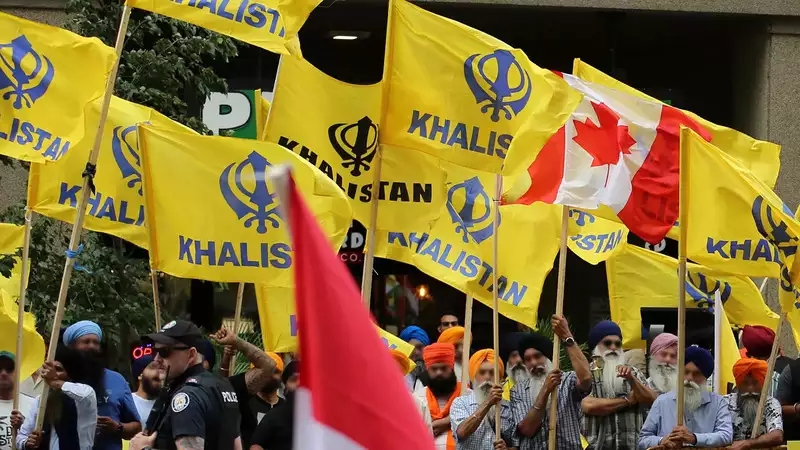
Under Trudeau, Canada has become Khalistani extremism’s global hub. He cannot cite free speech law to defend inaction as Canada has other laws against hate and incitement to violence that should be invoked.
Brahma Chellaney, The Times of India
Canadian Prime Minister Justin Trudeau has tried to deflect attention away from his cosy political ties to radicals and his government’s indulgence of violence-espousing Khalistanis by seeking to put India in the dock with an astounding allegation. Trudeau’s evidence-free claim should not obscure a larger problem confronting India — the five Anglosphere countries’ sheltering of Sikh extremists that endorse violence as a legitimate tool to achieve Khalistan.
The Khalistan idea has few takers among Sikhs in India, as the highly regarded, Washington-based Pew Research Centre highlighted in a poll released in 2021. The survey found that 95% of Sikhs are “very proud to be Indians”. In fact, 70% of Sikhs believe “a person who disrespects India cannot be a Sikh”. Even in Canada and other English-speaking countries, Khalistan supporters make up just a fraction of the Sikh diaspora.
Yet an unholy combination of two factors is keeping Khalistan militancy alive overseas. The first is Pakistan’s funding, support and possible training of Khalistanis in a bid to destabilize India, as a Hudson Institute report brought out.
More surprising is the role of Canada, Britain, the US, Australia and, marginally, New Zealand, as if no lesson has been learned from the 1985 bombing by Khalistani extremists of an Air India flight from Toronto that killed all 329 people on board. These countries continue to look the other way as Sikh radicals step up their militancy from Western soil, including issuing death threats and calls to violence. The inaction has emboldened the extremists to vandalize Indian diplomatic missions and Hindu temples and threaten Indian diplomats.
Long before Trudeau’s allegation plunged Indo-Canadian ties to their lowest ebb, New Delhi was urging the Anglosphere countries to rein in the rising tide of Khalistani militancy directed at India. Instead what India got were nasty surprises — from militants storming the Indian High Commission in London and dual attacks on the Indian consulate in San Francisco to an anti-India parade in Canada seeking to immortalize Prime Minister Indira Gandhi’s assassins.
Khalistani militancy is particularly acute in Canada, which explains why its British Columbia province has become the global hub of the Khalistan movement. With India’s patience wearing thin, Prime Minister Narendra Modi, in a frosty meeting with Trudeau during the G-20 summit, gave him a dressing-down for being soft on Sikh terrorists.
To keep his minority government afloat, Trudeau depends on support from the New Democratic Party leader Jagmeet Singh, a Khalistan sympathizer. With the tail wagging the dog, Trudeau has pandered to hardline Canadian Sikhs. Take just one example: Trudeau cheered on Indian farmers blockading highways near New Delhi and then later, in the style of an autocrat, declared a national emergency in Canada and crushed peaceful protests against his COVID-19 vaccination policy, calling their blockades a security threat akin to terrorism.
Yet Trudeau refuses to act against the real terrorists in Canada that threaten Indian security. Harbouring violent extremists also threatens Canadian and international security because a day may come when Canadian Khalistani militants carry out a major terrorist strike within Canada or another Western country.
Canada’s record of shielding Khalistani terroristsis a case of“like father, like son”. Trudeau’s father, Prime Minister Pierre Trudeau, turned down Indira Gandhi’s 1982 request for extradition of Babbar Khalsa chief Talwinder Parmar who, according to Canada’s official probe, went on to become the mastermind of the Air India flight bombing. Today, the growing nexus between Khalistani extremists and criminal bands in British Columbia has spawned gangland killings.
In this light, Trudeau’s allegation against India clearly seems a diversionary tactic to help obscure sordid facts, including the continued cover he is giving to operations of Khalistani militants in the name of free speech. His allegation is based not on any police-collected evidence but on purported inputs from the murky world of espionage. In the spy games, geopolitics often trumps facts.
India should not allow Trudeau to deflect attention from Canada’s answerability on becoming a safe haven for militants promoting or glorifying terrorism. Canada cannot cite free speech law to defend inaction because it has other laws against hate or incitement to violence that ought to be invoked. Without curbing its Khalistani militancy, Canada could undermine its internal security, becoming one day the Pakistan of the West.
Indian diplomacy must also exert sustained pressure on the other Anglosphere countries to stop countenancing the rising anti-India activities of extremist Khalistani groups operating from their territories. The paradox is that even as a tilt toward the West is becoming apparent in Indian foreign policy, the Anglosphere countries seem to be looking at the violent Khalistani extremists they shelter as potential leverage against India. Mutual respect and mutual security are indispensable to an informal alliance between the West and India.
For starters, Canada and India must arrest the downward spiral in their relations through quiet diplomacy. With no significant conflict of strategic interest, these two major democracies ought to be close partners. Trudeau can secure India’s cooperation on the murder probe if he is willing to clean up his act at home — in Canada’s own long-term interest.
Brahma Chellaney is a geostrategist.

You must be logged in to post a comment.